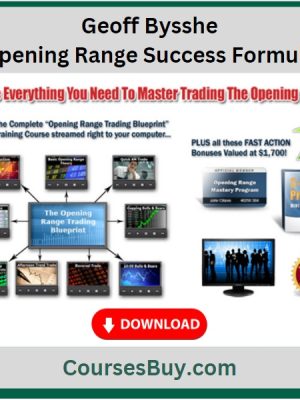Steve Nison & Ken Calhoun – Stock Trading Success
$179.00
Steve Nison & Ken Calhoun Stock Trading Success Course [Download]

1️⃣. What is Ken Calhoun Stock Trading Success:
Stock Trading Success by Steve Nison and Ken Calhoun teaches effective stock market trading. It covers advanced strategies and real-world applications, focusing on market signals and movements.
The course includes candlestick charting techniques and real-time trading dynamics. It aims to help traders make informed, successful decisions in the stock market.
? PROOF OF COURSE


2️⃣. What you will learn in Stock Trading Success:
- Real-time Trading Techniques: Learn to identify and capitalize on gaps and breakouts as they happen.
- Entry and Exit Strategies: Master the precise timing for entering and exiting trades to maximize gains.
- Profit Planning: Develop a clear plan to identify profitable trades and manage risks effectively.
- Understanding Market Dynamics: Gain insights into the inner workings of Wall Street and how market makers influence stock prices.
- Practical Trading Skills: Apply strategies through 14 DVDs of content, including real-life trading scenarios.
- Candlestick Charting: Discover the power of Japanese candlestick patterns to forecast market movements accurately.
3️⃣. Stock Trading Success Course Curriculum:
- Module 1: Trading the OPEN – How To Profit From Realtime Gaps & Breakouts
- Module 2: You Make The Call – How To Set Entries And Exits
- Module 3: Planning Your PROFITS – Hidden Signals For Hot Trades
- Module 4: Wall Street’s Secrets – Winning In Realtime Markets
- Module 5: Trader’s Breakout Blueprint for Successful Trades
- Module 6: Traders’ Live HOT SEATS – Turning Traders Into Tigers
- Module 7: Rapid-Fire Crash Course For Trading LIVE Markets – Instant Immersion
- Module 8: Trading Dynamics – Advanced Strategies For Trading Ahead of the Crowd
- Module 9: Traders’ Survivors’ Guide – How To Prosper In Any Market Environment
- Module 10: Top Traders’ Tactics You Never Knew Existed (And How To Profit From Them)
- Module 11: Power Trading Strategies – How To Spot Winning Trades In Realtime Markets
- Module 12: Taking Action Today – Your Trading Success Accelerators
- Module 13 (Bonus): Candlestick Charting Basics – Spotting The Early Reversals
- Module 14 (Bonus): Winning Chart Patterns For NASDAQ Day Traders
The Stock Trading Success course, led by Steve Nison and Ken Calhoun, offers a robust curriculum designed to enhance your trading skills across various market conditions. This comprehensive program covers everything from the basics to more advanced strategies.
Participants will learn how to master the fundamentals of real-time gaps and breakouts. The course also delves into advanced strategies for predicting market movements and managing volatility.
It combines theoretical knowledge with practical applications, ensuring traders are well-equipped. The goal is to help participants identify and execute profitable trades consistently.
4️⃣. Who is Steve Nison & Ken Calhoun?

Steve Nison is heralded as the pioneer of bringing candlestick charting to the Western world. With the prestigious Chartered Market Technician (CMT) designation, he has over 30 years of experience in technical analysis. Nison has authored essential texts such as the “Japanese Candlestick Charting Techniques,” providing foundational knowledge to traders globally.
His expertise is sought after by major financial institutions like Fidelity, J.P. Morgan, and Goldman Sachs, reflecting his status as a top analyst. Not only has Nison’s work featured in esteemed publications like The Wall Street Journal and Barron’s, but his engaging seminars have also achieved international acclaim, shaping trading strategies in numerous countries.

Ken Calhoun is the founder of Daytrading University, a leading educational platform that has been at the forefront of teaching active trading strategies since 1999. Known for his dynamic approach to teaching day and swing trading for stocks, ETFs, e-minis, and Forex, Calhoun’s methods focus on price-action breakouts and practical, advanced strategies.
His career began as a dot-com day trader in the 1990s, and he has since evolved into a recognized expert and a prominent figure in trading education. Calhoun’s contributions to the trading community are extensive, with featured appearances in major trading publications and events, and collaborative projects with other trading experts, including Steve Nison.
5️⃣. Who should take this course?
Beginners to Stock Trading:
- Eager Learners: Individuals new to the stock market who are looking for a comprehensive introduction to trading principles and practices.
- Career Changers: Those considering a shift to trading as a new career path.
Experienced Traders:
- Skill Enhancers: Seasoned traders aiming to refine their strategies with advanced techniques like candlestick charting and real-time market analysis.
- Portfolio Expanders: Professionals looking to diversify their trading styles or add new trading instruments to their portfolios.
Financial Professionals:
- Industry Analysts: Financial analysts and other market professionals who need to deepen their understanding of market dynamics and trading strategies.
- Investment Advisors: Advisors seeking to broaden their service offerings with deeper insights into equity trading for their clients.
6️⃣. Frequently Asked Questions:
Q1: What is the difference between a stock and an equity security?
Equity securities represent ownership in a company, commonly referred to as stocks. While all stocks are equity securities, not all equity securities are stocks; they can also include options or other financial instruments that confer ownership rights.
Q2: Why do people invest in equity securities?
Investing in equity securities allows individuals to potentially profit from the growth of companies, receiving dividends, and selling shares at higher prices. It also provides the opportunity to own a part of a company and share in its financial successes.
Q3: What does volatility mean in trading?
Volatility refers to the degree of variation in the price of a security over time. High volatility means the price can change dramatically in a short period, which can present both higher risks and potential rewards for traders.
Q4: How do proprietary traders make money?
Proprietary traders make money by trading a firm’s capital on various financial markets to capitalize on market inefficiencies. Profits are generated through strategies that might involve short-term trades, arbitrage, or other methods.
Q5: What is the difference between OTC and exchange markets?
Over-the-counter (OTC) markets facilitate the trade of securities not listed on formal exchanges. These trades are conducted directly between parties. In contrast, exchange markets, like the NYSE, operate under a structured system where all trades are conducted through the exchange, providing more transparency and regulation.
Q & A
Related products
Stock Forex Options - Trading
Stock Forex Options - Trading
Stock Forex Options - Trading
Stock Forex Options - Trading
Stock Forex Options - Trading
Stock Forex Options - Trading
Stock Forex Options - Trading
Stock Forex Options - Trading











Reviews
There are no reviews yet